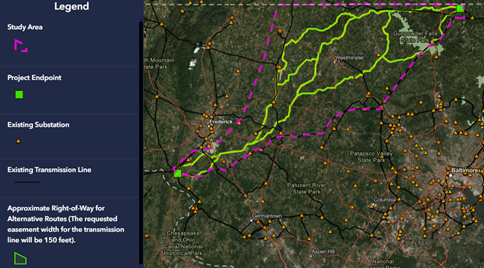[co-author: Derek Lee*]
To address the diminishing capacity of our region’s electric grid, a New Jersey-based corporation known as the Public Service Enterprise Group (“PSEG”) is set to build 70 miles of aboveground power lines through Baltimore, Carroll, and Frederick Counties. PSEG’s proposal is advertised as the Maryland Piedmont Reliability Project. Here’s what you need to know about the Project.
Where is the Project?
An interactive map available on PSEG’s website (pictured below) depicts ten potential routes connecting the transmission line endpoint in northern Baltimore County to a substation endpoint in southern Frederick County. No matter the route, if the Maryland Piedmont Reliability Project moves forward, new power lines will cut through private land long-used by families, farmers, and businesses across Baltimore, Carroll, and Frederick Counties. PSEG plans to ask the state of Maryland for necessary permits by the end of 2024, and to complete the Project by June 2027.

What happens if your property is in the Project’s path?
PSEG’s decision on where to place the new transmission lines depends on several factors, including minimizing costs and the environmental impact. One significant yet seldom publicized expense is the cost associated with acquiring private land to advance the Project.
If you own land on or near any potential route, be vigilant. PSEG is bound to send representatives—some of whom work for PSEG and some who work for other entities but acquire property on PSEG’s behalf—to negotiate for land necessary to construct the Project. The Baltimore Sun recently reported that an “unknown entity” is already using “predatory” tactics to acquire land in Carroll County.
It is imperative that property owners stand firm in response to these offers. The Constitution guarantees that a condemning authority pay “just compensation” when acquiring private property for public use. While PSEG may claim its offer is fair, it’s highly probable that the offer is below market value.
But don’t be fooled. Rejecting PSEG’s initial offer does not mean that PSEG won’t acquire your land. Any land not acquired voluntarily may be acquired by force of eminent domain. Standing firm simply messages to PSEG that you will not relinquish title to your property, or any part thereof, for less than full compensation.
How can I preserve and protect my rights?
Each landowner’s situation is unique. Unsightly power lines affect the utility and value of an operating farm or business differently than a family’s home. If you are in the difficult position of losing some or all of your private land to PSEG’s Project, hire an experienced eminent domain attorney to help secure the just compensation you deserve.
*Law Clerk, 2024